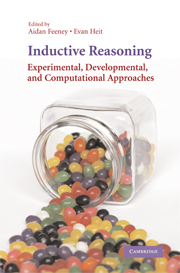Book contents
- Frontmatter
- Contents
- List of Figures
- List of Tables
- List of Contributors
- Preface
- 1 What Is Induction and Why Study It?
- 2 The Development of Inductive Reasoning
- 3 Interpreting Asymmetries of Projection in Children's Inductive Reasoning
- 4 Property Generalization as Causal Reasoning
- 5 Availability in Category-Based Induction
- 6 From Similarity to Chance
- 7 Theory-Based Bayesian Models of Inductive Reasoning
- 8 Use of Single or Multiple Categories in Category-Based Induction
- 9 Abductive Inference: From Philosophical Analysis to Neural Mechanisms
- 10 Mathematical Induction and Induction in Mathematics
- 11 Induction, Deduction, and Argument Strength in Human Reasoning and Argumentation
- 12 Individual Differences, Dual Processes, and Induction
- 13 Taxonomizing Induction
- Index
9 - Abductive Inference: From Philosophical Analysis to Neural Mechanisms
Published online by Cambridge University Press: 26 February 2010
- Frontmatter
- Contents
- List of Figures
- List of Tables
- List of Contributors
- Preface
- 1 What Is Induction and Why Study It?
- 2 The Development of Inductive Reasoning
- 3 Interpreting Asymmetries of Projection in Children's Inductive Reasoning
- 4 Property Generalization as Causal Reasoning
- 5 Availability in Category-Based Induction
- 6 From Similarity to Chance
- 7 Theory-Based Bayesian Models of Inductive Reasoning
- 8 Use of Single or Multiple Categories in Category-Based Induction
- 9 Abductive Inference: From Philosophical Analysis to Neural Mechanisms
- 10 Mathematical Induction and Induction in Mathematics
- 11 Induction, Deduction, and Argument Strength in Human Reasoning and Argumentation
- 12 Individual Differences, Dual Processes, and Induction
- 13 Taxonomizing Induction
- Index
Summary
WHAT IS ABDUCTION?
In the 1890s, the great American philosopher C. S. Peirce (1931–1958) used the term “abduction” to refer to a kind of inference that involves the generation and evaluation of explanatory hypotheses. This term is much less familiar today than “deduction,” which applies to inference from premises to a conclusion that has to be true if the premises are true. And it is much less familiar than “induction,” which sometimes refers broadly to any kind of inference that introduces uncertainty, and sometimes refers narrowly to inference from examples to rules, which I will call “inductive generalization.” Abduction is clearly a kind of induction in the broad sense, in that the generation of explanatory hypotheses is fraught with uncertainty. For example, if the sky suddenly turns dark outside my window, I may hypothesize that there is a solar eclipse, but many other explanations are possible, such as the arrival of an intense storm or even a huge spaceship.
Despite its inherent riskiness, abductive inference is an essential part of human mental life. When scientists produce theories that explain their data, they are engaging in abductive inference. For example, psychological theories about mental representations and processing are the result of abductions spurred by the need to explain the results of psychological experiments. In everyday life, abductive inference is ubiquitous, for example when people generate hypotheses to explain the behavior of others, as when I infer that my son is in a bad mood to explain a curt response to a question.
Information
- Type
- Chapter
- Information
- Inductive ReasoningExperimental, Developmental, and Computational Approaches, pp. 226 - 247Publisher: Cambridge University PressPrint publication year: 2007
Accessibility standard: Unknown
Why this information is here
This section outlines the accessibility features of this content - including support for screen readers, full keyboard navigation and high-contrast display options. This may not be relevant for you.Accessibility Information
- 26
- Cited by
